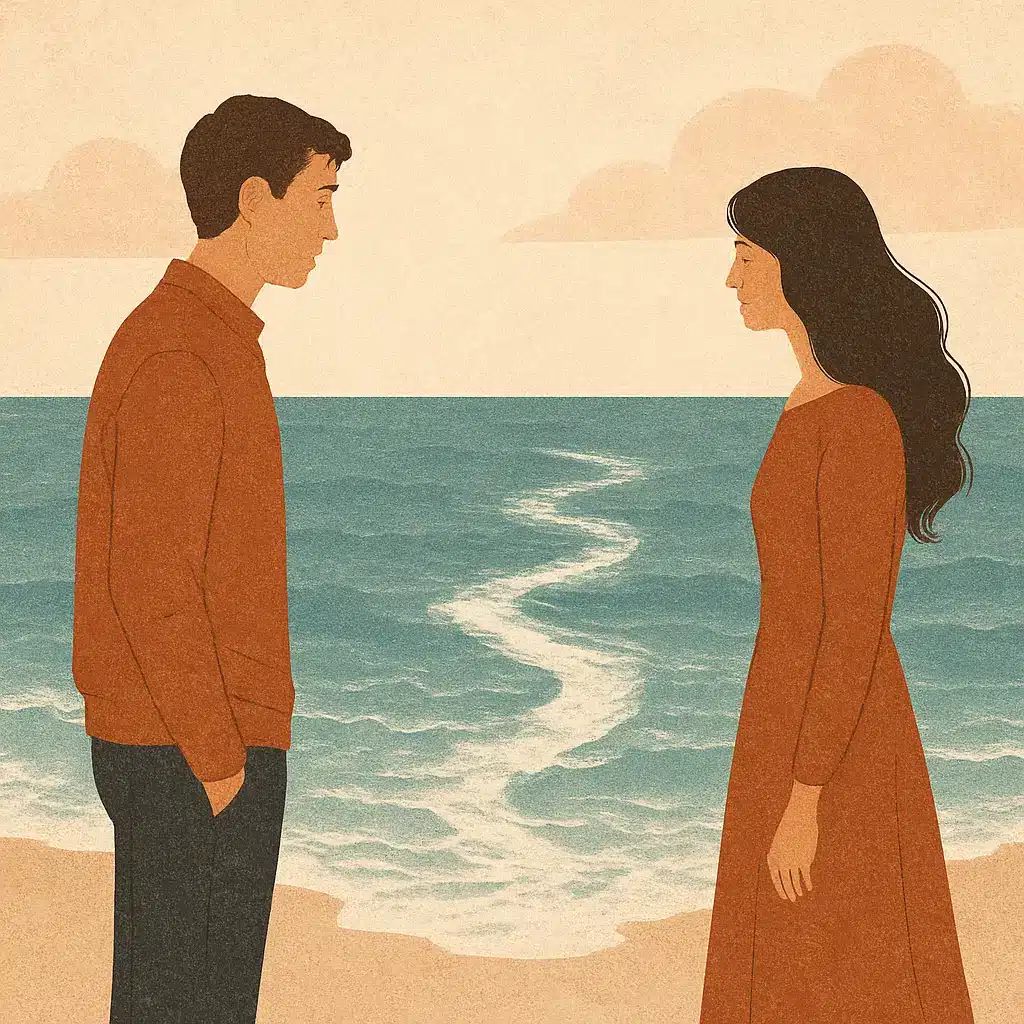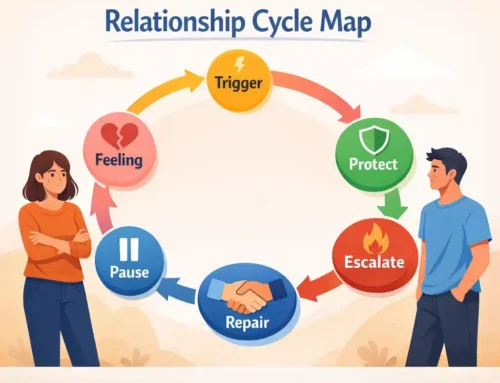
Approx. read time: 6.9 min.
Post: In and out of Love: The 7 Truths Behind it All
In and out of love. Love is one of the most powerful human emotions, yet it is also one of the most misunderstood. When people ask if it is possible to be “in and out of love,” the question touches on something deeply human: the fear that fluctuating emotions may mean a relationship is broken. But love is not static. It is not a switch that is simply turned on or off. Instead, love is a dynamic force — shifting, deepening, cooling, and sometimes reigniting depending on the seasons of life.
This article will explore the nature of fluctuating feelings in long-term relationships, why they occur, what they mean, and how couples can distinguish between natural cycles of closeness and distance versus signs that the relationship may no longer serve them.
Love as Both a Feeling and a Choice-In and out of love
One of the first points to recognize is that love is not just an emotion; it is also a decision. Early-stage love is heavily influenced by infatuation, chemistry, and novelty. This phase is often called limerence — the intoxicating rush of attraction and excitement that makes everything feel new and effortless. Over time, however, limerence naturally fades.
Long-term love shifts from being primarily about feelings to being more about choice, commitment, and shared meaning. When life becomes stressful — whether from financial worries, health struggles, career demands, or raising children — it is normal for feelings of passion to wane. But this doesn’t necessarily mean the love is gone. It means the form of love has changed.
Couples who understand this distinction between feeling “in love” and choosing to act with love often navigate the ups and downs more gracefully.
Why Feelings of Love Fluctuate-In and out of love
There are many reasons why someone might feel in and out of love during the course of a long-term relationship.
1. Life Stress and External Pressures
Major life events — a move, job change, illness, or financial strain — can take attention away from the relationship. During these times, feelings of closeness may weaken not because love is gone, but because stress has hijacked emotional energy.
2. Familiarity and Routine
The human brain is wired to respond to novelty. After years with the same partner, the thrill of “newness” diminishes. Some interpret this as falling out of love when in reality it is the normal settling of passion into comfort and companionship.
3. Personal Growth and Change
People evolve over time. A partner you were fully aligned with at 25 may feel different at 35 or 45. If couples don’t grow together, one partner may temporarily feel “out of love” simply because their personal needs and values are shifting.
4. Unresolved Conflict or Resentment
Unspoken issues, past betrayals, or ongoing disagreements can erode intimacy. Love may feel distant not because it has disappeared, but because unresolved pain creates emotional walls.
5. Physical and Emotional Intimacy Cycles
Desire and affection naturally ebb and flow. Hormonal shifts, health issues, and even seasonal changes can influence libido and emotional availability. It is not uncommon for one partner to misinterpret a temporary dip in intimacy as falling out of love.
The Normal Ebb and Flow of Connection-In and out of love
Think of love like the tide. At times, it rushes in with intensity, washing over both partners with warmth and closeness. At other times, it recedes, leaving behind space that may feel empty or unsettling. But just as the tide always returns, love too can resurge — if the foundation of the relationship remains intact.
In fact, some psychologists argue that these fluctuations are not only normal but healthy. They allow space for individuality, personal growth, and renewal within the relationship. Without periods of distance, the relationship could risk stagnation.
When “Out of Love” Signals Deeper Trouble
That said, not every ebb is harmless. There is a difference between normal fluctuation and a prolonged sense of detachment that indicates deeper issues. Warning signs include:
- Feeling consistently indifferent or resentful toward your partner.
- A lack of desire to resolve conflicts or invest effort.
- Seeing your partner more as a roommate than a life companion.
- Persistent longing for connection outside the relationship.
- A sense that your core values or life goals no longer align.
When the “out of love” phase stretches into months or years, it may not simply be a cycle. It may be a signal that the relationship is no longer meeting fundamental needs.
The Psychology of “Falling Back in Love”
The good news is that love can often be rekindled, even after it seems to have faded. Research shows that couples who intentionally nurture their bond can reignite feelings of closeness and passion. Some strategies include:
- Prioritizing Quality Time
Shared experiences, especially novel ones, stimulate dopamine — the same brain chemical active in early romance. Traveling, learning something new together, or simply creating rituals like weekly date nights can rebuild connection. - Open and Vulnerable Communication
Honest conversations about needs, fears, and desires foster emotional intimacy. Vulnerability often reawakens empathy and love. - Repairing Past Hurts
Addressing unresolved conflicts and forgiving old wounds clears the emotional clutter that blocks love from resurfacing. - Physical Affection
Touch — from holding hands to cuddling — stimulates oxytocin, the bonding hormone. Small gestures of physical closeness often reignite emotional connection. - Choosing Love Daily
Even when feelings are dim, small acts of kindness and appreciation reinforce the decision to love. Over time, these actions can reignite the emotional spark.
The Role of Self-Reflection
It’s also important to consider that sometimes feeling “out of love” says more about the individual than the relationship itself. A person struggling with depression, burnout, or self-doubt may project their inner disconnection onto the partnership. In such cases, addressing personal well-being can restore relational connection.
Cultural Myths About Love
Much of the fear around fluctuating feelings stems from cultural myths. Popular media often portrays love as an all-or-nothing experience — either you are madly in love, or the relationship has failed. In reality, this binary view is misleading.
- Myth 1: True love means never doubting your feelings.
In truth, doubt is normal, especially during stress or transition. - Myth 2: If the spark fades, the relationship is over.
Passion naturally cools, but love can evolve into a deeper, more enduring bond. - Myth 3: Love should always feel effortless.
Sustaining love requires effort, communication, and intentionality.
Recognizing these myths helps couples release unrealistic expectations and embrace the natural rhythm of long-term intimacy.
Healthy Pride in Love vs. Unhealthy Fear
There is also a subtle difference between embracing the normal ebb and flow versus living in fear of losing love. Healthy couples recognize that feelings fluctuate, but they trust the deeper commitment. They see dips not as danger, but as opportunities to reconnect.
Unhealthy patterns emerge when one partner panics at every ebb, misinterpreting temporary distance as abandonment. Ironically, this fear-driven behavior can push the relationship further apart.
When to Reevaluate the Relationship
Of course, not every relationship is meant to last forever. Sometimes, being “out of love” reflects a genuine truth — that two people have grown in different directions. The challenge is to discern whether the current distance is:
- A temporary season that can be navigated with effort and patience.
- A persistent reality that reflects deeper incompatibility.
Therapy, honest reflection, and open dialogue often help couples make this distinction.
Conclusion: Yes, You Can Be In and Out of Love
So, can you be in and out of love? The answer is yes — and it is entirely normal. Love is not a fixed state but a living, breathing dynamic that changes over time. Fluctuations do not automatically signal failure. In fact, they can be opportunities for renewal, growth, and deeper connection.
But when the “out” periods become prolonged and heavy, it may be time to reflect on whether the relationship still serves both partners. Ultimately, love is both a feeling and a choice. Choosing to nurture it — even through its cycles — is what allows it to endure.










